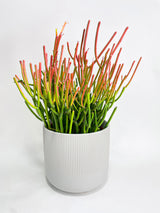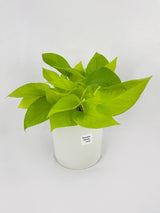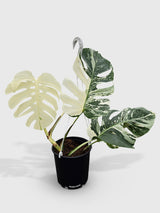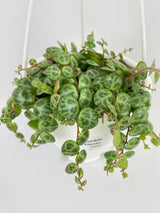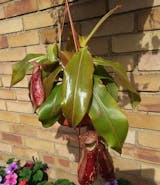Nepenthes St. Gaya is a captivating and unusual carnivorous plant native to the highlands of Borneo. What sets it apart are its pitcher-shaped leaves, which act as ingenious traps for insects, making it one of the few plants that can truly "eat" its prey. The St. Gaya variety is particularly known for its vibrant red, orange, or green pitchers and intricate patterning. This plant not only showcases nature's remarkable adaptability but also serves as a captivating conversation piece for plant enthusiasts.
* You will receive ONE (1) 4" plant in nursery pot, unless stated otherwise. Refer to our FAQ for more information.
Nepenthes St. Gaya 'Carnivorous Pitcher Plant' Plant Care
Watering
Nepenthes St. Gaya enjoys consistently moist soil. Use distilled or rainwater to keep the soil evenly damp but not waterlogged. It's crucial to keep the soil's moisture level stable, as the plant uses its pitchers for hydration as well.
Light
Place your St. Gaya in bright, indirect sunlight. Avoid harsh, direct sun, which can scorch the delicate leaves and reduce the effectiveness of the pitchers.
Temperature
These plants appreciate warmer temperatures, typically between 70°F to 85°F (21°C to 29°C) during the day. At night, a slight drop in temperature is beneficial, but avoid exposing them to extreme cold.
Soil Mix
Use a well-draining, acidic soil mix. A blend of sphagnum moss and perlite is often ideal for Nepenthes. The acidity mimics their natural habitat and supports healthy growth.
Humidity
Maintaining high humidity is essential for Nepenthes. Aim for levels above 50%. In drier environments, you may need to use a humidifier or place a tray of water with pebbles near the plant to increase moisture in the air.
Fertilizer
Nepenthes derives nutrients from the insects it traps. However, providing occasional, diluted, and insect-free fertilizer can supplement its diet. Use a fertilizer specifically formulated for carnivorous plants, applied sparingly.
Toxicity
Nepenthes St. Gaya is non-toxic to humans and animals. However, its pitchers are enticing to insects, and the plant relies on them for sustenance.
















